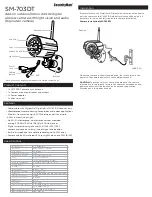
x 1
1
2
3
8
x 3
+
Pet
2.1m-2.4m
(6'11"-7'10")
(Not evaluated by UL)
PIR
2.1m-2.7m
(6'11"-8'10")
Deadzone: 0.30m (1')
Transmitter/Receiver Communication Setup
The detector must identify itself to the system’s receiver by
performing the following steps (:
1. Set the receiver to Write Mode.
2. Remove the battery from the insulation material.
3. Send a WRITE message by pressing both of the tamper switches
(back and cover) for at least 3 seconds.
Verify that the detector has been identified by the receiver.
CONFIGURACIÓN DE LACOMUNICACIÓN TRANSMISOR / RECEPTOR
El detector debe identificarse ante el receptor del sistemaescribiendo su
mensaje codificado en la memoria dedirección del receptor. Esto se logra
ejecutando lospasos siguientes:
1. Colocar el receptor en Modo Write.
2. Remover el material aislante de la batería.
3. Mandar un mensaje Write pulsando los dos botones interruptores del
tamper (posterior y delantero) al menos por 3 segundos.
Verificar que el detector ha sido identificado por el receptor
CONFIGURAÇÃO DACOMUNICAÇÃO TRANSMISSOR / RECEPTORO
O detector deve identificar-se ante o receptor do sistema, gravando sua
mensagem codificada na memória deendereços do receptor. Este
procedimento é realizadoda seguinte maneira:
1.Coloque o receptor no Modo de Gravação (Write).
2.Remova a proteção de isolamento da pilha.
3.Mande uma mensagem Write, apertando os dois botões interruptores do
tamper (posterior e dianteiro) durante, no mínimo, 3 segundos.
Verifiqueque o detector tenha sido identificado pelo receptor.
T
6
EN
T
IT
SP
FR
PR
Mise en communication del'émetteur/ récepteur
Le récepteur du système doit identifier le détecteur par lebiais de
l'inscription du message codé de ce dernierdans sa mémoire d'adresses.
Cette opération s'exécuteselon les étapes suivantes :
1. Réglez le récepteur en mode écriture (Write).
2. Retirez la pile de l'équipement d'isolation.
3. Envoyez un message en écriture en appuyant simultanément sur les
touches d'autoprotection (arrière et frontale) pendant au moins
3 secondes.
Vérifiez que le détecteur a bien été identifié par le récepteur
CONFIGURAZIONE DELTRASMETTITORE / RICEVITORE
Il sensore deve essere identificato dal sistema ricevente eseguendo la
procedura seguente:
1. Predisporre il ricevitore nel Modo Indirizzo (Write).
2. Rimuovere la plastica di protezione dalla batteria.
3. Trasmettere l’indirizzo dell’unità al ricevitore premendo
contemporaneamente gli interruttori tamper (antiapertura e
antirimozione) per almeno 3 secondi.
Verificare che il trasmettitore sia stato identificato dal ricevitore.
Only 433MHz units are UL Listed.
PIR 433MHz - RWT92043300C
PET 433MHz - RWT92P43300C
PIR 868MHz - RWT92086800C
PET 868MHz - RWT92P86800C
www.riscogroup.com
www.riscogroup.co.uk
www.riscogroup.fr
www.riscogroup.it
www.riscogroup.com/dutch
www.riscogroup.com/esp
www.riscogroup.com/por
www.riscogroup.com/cn
<
36kg (80lb)
4
T
T
T
T
-10°C → 40°C
(14°F → 104°F)
7
PIR & PIR Pet Detectors
Caution:
The battery used in this device may present a fire or chemical burn hazard
if mistreated. Do not recharge, disassemble, heat above 100°C (212°F) or dispose
of in fire. Replace battery with (battery mfg's name or end-product mfg's name and
part no. only) use of another battery may present a risk of fire or explosion.
Dispose of used battery promptly. Keep away from children. Do not disassemble and
do not dispose of in fire.
5
EN
Mise en garde :
risque d'explosion si la pile est remplacée par un type incorrect.
Débarrassez-vous des batteries usagées en accord avec les règlementations locales.
Attenzione
: Pericolo di esplosione in caso di utilizzo di un tipo di batterie non
adeguato. Smaltire le batterie secondo la normativa vigente.
IT
Cuidado
: Si la batería se reemplaza por un tipo incorrecto hay riesgo de explosión.
Elimine las baterías usadas según las regulaciones locales.
SP
FR
PR
Cuidado
: Pode ocorrer o risco de explosão caso substituir as pilhas por outras
de tipo indevido. É necessário desfazer-se das pilhas usadas de acordo com os
regulamentos locais.
Tamper
Tamper
The batteries have to be
replaced every three years.
THE LITHIUM BATTERY IS
NOT USER REPLACEABLE,
SERVICING AND
REPLACEMENT MUST BE
DONE BY A TRAINED
TECHNICIAN (refer to
technical specifications
section for types of batteries
to be used).
It is recommended to have a
walk test for the detector
more than once a year.
Use only CR123A
batteries:
DURACELL DL123A
GPI International
CR123A
PANASONIC CR123A
SANYO CR123A
VARTA CR123A
Must be installed in accordance
with nfpa70, local authorities
having jurisdiction (AHJ'S) and all
local codes
Models: iWISE T92
iWISE T92P
UL statement:
These detectors operate
only with RISCO’s
LISTED ProSYS control
units and wireless
receivers




















